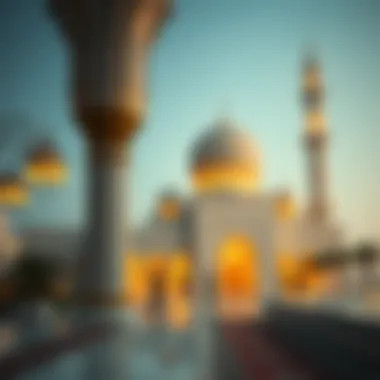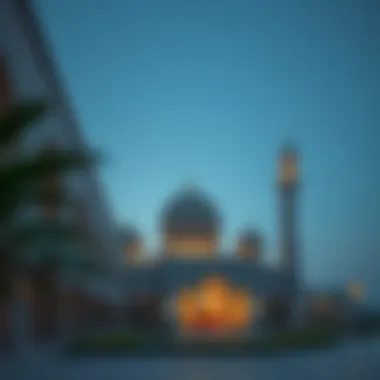Ramadan 2023 UAE Timing: Key Dates and Insights


Intro
Ramadan is more than just a month of fasting; it's a sacred period that resonates deeply with millions around the world, especially in the UAE. In 2023, as the moon sighting marks the beginning of this holy month, residents are set to engage in spiritual reflection and community bonding. The significance of this time goes beyond abstaining from food and drink; it encapsulates cultural practices, community interactions, and spiritual growth.
The timing of Ramadan varies each year, influenced by the lunar calendar. For many Muslims, knowing the precise times for fasting and prayer is essential for fulfilling their religious duties properly. In this article, we'll explore the specifics of Ramadan 2023 timing in the UAE, highlighting key aspects such as fasting schedules, prayer timings, and how these affect daily life. Moreover, this article serves as a resource for understanding the cultural importance of Ramadan in the UAE, shedding light on communal activities and traditional practices that enhance the spirit of this month. By the end, readers will gain not just insight into the timings but also an understanding of the community's heartbeat during this significant time of the year.
Let’s dive into the timings that govern this holy month and their impact on the lives of those living in the UAE.
Understanding Ramadan: Significance and Observances
Ramadan holds a revered place in the hearts of Muslims, embodying a period of reflection, spiritual growth, and community connection. This segment of the article endeavors to provide a nuanced understanding of the various aspects of Ramadan, shedding light on the practices that define this month for millions in the UAE and beyond. By grasping the significance of Ramadan, we can appreciate why it transforms daily life within the region, fostering a sense of solidarity and shared purpose among communities.
Historical Context of Ramadan
To comprehend the relevance of Ramadan today, one must delve into its historical roots. Ramadan is the ninth month of the Islamic lunar calendar and is believed to commemorate the month when the Quran was first revealed to Prophet Muhammad. This connection to the divine makes Ramadan not just a time of fasting, but a celebration of the very foundation of Muslim faith. Historically, societies have observed this month by engaging in deeper prayer and self-reflection, fostering a surge in spirituality that transcends generations.
Spiritual Importance of Fasting
Fasting during Ramadan is not merely an act of abstaining from food and drink but serves a profound spiritual purpose. Observing the fast helps individuals cultivate self-discipline, empathize with the less fortunate, and enhance their gratitude for life's blessings. This conscious act of self-denial opens a gateway to spiritual reflection, pushing boundaries of personal growth. Many find that it creates a lasting impact, prompting them to adopt healthier lifestyle changes even after the month concludes. Ramadan serves as a reminder that spiritual nourishment often eclipses physical needs.
Common Ramadan Practices
This holy month is characterized by practices that enrich both individual experience and communal bonding.
Suhoor and Iftar
Suhoor and Iftar are two key elements of Ramadan that hold significant importance. Suhoor, the pre-dawn meal, fuels observers for a day of fasting. The rite of waking early to share a meal with family becomes a cherished tradition, fostering unity before the day unfolds. Choices can range from wholesome oats to heartier fare, providing necessary sustenance. Meanwhile, Iftar, the meal breaking the fast at sunset, symbolizes community and hospitality. Families and friends gather, often sharing elaborate spreads of food that celebrate culinary heritage, underscoring the theme of generosity inherently woven into Ramadan.
Ultimately, the communal aspect of Iftar can lead to numerous organized gatherings where strangers become friends, sharing both meal and moment, amplifying the essence of charity during this holy month.
Taraweeh Prayers
Taraweeh prayers, performed after the evening prayer, represent a spiritually uplifting practice during Ramadan nights. These prayers are unique in that they offer an opportunity to recite extended portions of the Quran. Engaging in Taraweeh is often seen as a way to deepen one's connection to the faith while generating an atmosphere of community worship. On a social level, gathering in mosques for these nightly prayers cultivates fellowship, as thousands come together, reinforcing a collective devotion.
Through these practices, Ramadan evolves into an experience that shapes not only one’s spirituality but also social fabric. This month goes beyond fasting; it encapsulates a time for reflection, growth, and community gathering. The layers of history, spirituality, and practices serve to connect individuals, making Ramadan a time of significance bound by the threads of faith, family, and fraternity.
Ramadan Dates in the UAE
The timing of Ramadan in the UAE bears significant importance, not only for the Muslim population but for the country as a whole. As a time of fasting and spiritual reflection, it reshapes daily life, influencing work schedules, cultural events, and community spirit. Understanding the specific dates for Ramadan in 2023 helps individuals prepare mentally and practically for this holy month.
Start and End Dates
Expected Dates
The expected start date for Ramadan in 2023 is anticipated to be on the evening of March 22, with the month likely ending on the evening of April 21. This estimated timeframe is grounded in the lunar calendar, which can be somewhat unpredictable due to natural variances in moon sighting.
One key characteristic of these expected dates is that they not only impact the fasting periods but also dictate the overall rhythm of life within the UAE throughout Ramadan. Many consider this time as a period of heightened spirituality and growth. The anticipation of this month is palpable, as devout Muslims and even businesses prepare to adapt their schedules according to the daily fasting rituals.
However, there's a flip side to this convenience. Sometimes, these expected dates might change depending on moon sightings, leading to uncertainty. Nonetheless, such anticipation connects the community and strengthens cultural practices surrounding Ramadan, reinforcing its role in uniting families and friends during Suhoor and Iftar.
Moon Sighting Ceremony
The Moon Sighting Ceremony is an age-old tradition marking the beginning and end of Ramadan. This custom involves local religious authorities and committees gathering to witness the crescent moon, signifying the start of the month. This celestial event embodies the spiritual significance of Ramadan.


This ceremonial observation is vital for Islamic communities worldwide, and it holds a distinctive place in the UAE where local culture heavily celebrates such traditions. The accuracy and authenticity of moon sightings enhance credence to the established dates, creating a sense of community among the citizens. On the flip side, varying interpretations of the sighting amongst different groups can sometimes lead to divergent observances of the fasting period, though generally, everyone ultimately aims to align their practices closely.
Significant Days During Ramadan
Significant days in Ramadan often hold great value, fostering a sense of unity and collective purpose.
Laylat al-Qadr
Laylat al-Qadr, or the Night of Power, is notably observed during the last ten nights of Ramadan, with many believing it to occur on odd-numbered nights. This night is distinguished as being better than a thousand months, making it highly revered among Muslims. It represents a period of divine mercy and forgiveness, where prayers are particularly powerful. The significance of this night cannot be overstated; it encourages deep reflection, penance, and spiritual renewal. The community often engages in increased prayers, readings of the Qur'an, and charitable acts.
Nevertheless, due to its spiritual weight, some might feel overwhelmed in attempting to maximize the benefits of this night. It’s a time that invites both hope and solemnity, enriching the observance of Ramadan beyond mere fasting.
Eid al-Fitr
Eid al-Fitr marks the conclusion of Ramadan but is much more than just the ending of the month of fasting. It celebrates the strength of faith and community. Families come together to share exquisite meals, exchange gifts, and participate in communal prayers. The joyous atmosphere is a sharp contrast to the previous month, reminding each individual of the importance of generosity and compassion.
One unique feature of Eid al-Fitr includes the Zakat al-Fitr, a charitable donation given before the Eid prayer. This act emphasizes the core Islamic tenet of charity, seeking to purify one’s fasting and ensuring that all community members can participate in the celebrations, regardless of their means.
However, preparations for Eid can be intense, leading to a feeling of pressure to meet familial and cultural expectations. Proper timing and planning are essential to balance the joyous obligations that come with this festival.
Embracing these significant days with respect and understanding contributes to enhancing communal bonds throughout this auspicious month.
Daily Timing of Fasting and Prayers
During Ramadan, one of the essential practices is the timing of fasting and prayers, which intricately weaves itself into the fabric of daily life for Muslims in the UAE. This is not merely about adhering to rituals; it significantly affects nutrition, health, and community interaction.
Each day begins before dawn with the Fajr prayer and the meal known as Suhoor, creating a harmonious start before the fasting period ensues. Following the day, the subsequent Maghrib prayer signifies the time for breaking the fast through Iftar. The overall structure of these timings helps align the spiritual and physical aspects of daily life throughout Ramadan.
Fajr Prayer and Suhoor Timing
Timing Variations Across UAE Cities
In the UAE, the timing of Fajr and Suhoor varies from one city to another due to geographical differences. For instance, those living in Dubai may notice that the Fajr prayer is announced a few minutes earlier than in Abu Dhabi. The rolling pattern of city sizes and latitudes causes not just a slight difference in timing, but a significant impact when one is aiming for precise prayer adherence and fasting.
Understanding these variations is crucial. For example, those who are serious about praying in congregation need to be aware of local times in respect to their location. This detail can aid individuals and families in planning their schedules more effectively during the holy month.
Recommendations for Suhoor
Eating Suhoor, the pre-dawn meal, is seen as a blessed act and provides necessary nutrition for the day ahead. The Suhoor meal ought to be wholesome and rich in proteins, fibers, and fluids to sustain energy levels through hours of fasting.
Some might recommend hearty options such as oatmeal or traditional dishes like foul medames. However, individuals should be encouraged to listen to their bodies and adapt meals to personal dietary needs, especially for those with health considerations. The nuances of Suhoor not only address sustenance but add layers of social interaction, as families typically gather for this meal before embarking on their fasting day.
Maghrib Prayer and Iftar Timing
Typical Iftar Meals
As the sun sets, the Maghrib prayer signals the end of the fast, accompanied by Iftar. This occasion is marked by breaking the fast with dates and water, followed by meals that often include a variety of traditional dishes. For instance, harira (a Moroccan soup) may be favored, or dishes like biryani and stuffed vegetables might grace the table, reflecting a blend of local and cultural influences.
The shared experience of Iftar offers a unique sense of community, encouraging gatherings among family and friends. It serves as a reminder that meals shared together can release the stresses and strains accumulated throughout the day, leading to sincere reconnections.
Community Iftar Events
Community Iftar events are a prominent aspect during Ramadan in the UAE. Various organizations and local mosques often host communal meals where anyone can join in, making it a unifying experience across diverse communities.


These events embody the spirit of generosity and charity, allowing people—both Muslims and non-Muslims—to come together in celebration. It's essential to recognize such events can encourage discussions about cultural perspectives and promote understanding.
From sharing culinary delights to forging friendships, community Iftar occasions foster an inclusive environment, helping to bridge cultural gaps and celebrate this sacred month with a greater purpose.
Impact of Ramadan on Daily Life in the UAE
Ramadan is more than just a month of fasting for Muslims; it’s a period that profoundly influences daily life in the UAE. This change impacts various sectors, from work routines to community gatherings. The rhythm of life slows down a bit, allowing for reflection, community bonding, and spiritual growth, all while maintaining a respectful atmosphere for those observing the fast.
Changes in Work Hours
Reduced Working Hours
During Ramadan, many organizations in the UAE implement reduced working hours. Typically, employees might have their workday shortened by an hour or two, compared to the standard timings. This adjustment is not just a gesture; it recognizes the unique demands placed on workers during fasting. The intention behind reduced hours is clear: it aims to accommodate the needs of Muslim employees, ensuring they have ample time for prayers and iftar.
The consideration for reduced working hours shines light on the community-centric approach adopted by many employers. It encourages productivity without compromising the employees' well-being. Moreover, organizations often report a boost in morale and motivation when staff members feel their needs are recognized and valued.
Flexible Arrangements
Another aspect tied to Ramadan's work culture is the increased opportunities for flexible arrangements. Many businesses promote a hybrid work model, allowing employees to choose when they operate during the day. For example, some may prefer to start early in the morning, wrapping up their work before the fast begins. Others might opt for later hours to align with iftar.
This flexibility caters to individual preferences, and breaks the monotony. In many cases, it also translates into higher productivity. Workers who can align their work schedules with their personal fasting routines often feel more engaged, ultimately benefiting the organization as a whole.
Effects on Cultural Events and Activities
Cultural Festivals
Ramadan is not solely about fasting but also about celebrating cultural and communal ties. Various cultural festivals take place throughout the month, featuring art, music, and food. These events enrich the spiritual atmosphere, creating a unique blend of traditional practices and modern expressions. They attract both locals and tourists alike, fostering understanding and appreciation of diverse cultures.
One key characteristic of these festivals is their inclusivity. While they honor Islamic traditions, they also welcome participation from individuals who may not observe Ramadan, making them a truly community-driven celebration. This creates an opportunity for dialogue and shared experiences among varied backgrounds, showcasing the UAE's multi-faceted society.
Art Exhibitions
Alongside cultural festivals, art exhibitions gain prominence during Ramadan. Museums and galleries often curate special collections reflecting themes of spirituality and community. These exhibitions serve as a medium to highlight the unique artistry inspired by Ramadan, often unveiling works from local and regional artists.
Participation in these showcases generally provides a platform for discussion within the community, exploring broader themes such as peace, unity, and reconciliation. However, the exhibitions sometimes face challenges like reduced attendance due to fasting hours, but that doesn’t deter the enthusiasm behind them.
Community Engagement During Ramadan
Volunteering Opportunities
Ramadan stirs a spirit of giving and volunteerism. Many organizations collaborate to facilitate numerous volunteering opportunities, from food drives to charity events. Giving back to the community becomes a central tenet during this month, with groups mobilizing efforts to support those in need.
Participating in these initiatives fosters a sense of unity and shared purpose among volunteers and recipients alike. They not only help support community members but also amplify the communal bonds that define the UAE’s social fabric. The experience can be transformational for those involved, creating lasting connections across different social strata.
Charitable Giving
Charitable giving is another cornerstone of Ramadan, where acts of charity take on greater significance. Residents are often encouraged to contribute through donations, either material or financial, to assist those less fortunate. This practice is deeply rooted in Islamic teachings, yet it transcends religious boundaries, inviting everyone to participate.
The unique feature of charitable giving during Ramadan is its collective nature; many organize donation drives, fostering a community spirit. However, the emphasis on giving can also lead to challenges where individuals may feel pressured. While the intentions behind such activities are noble, it's crucial that they remain accessible and voluntary for everyone, regardless of their financial situation.
"In Ramadan, giving becomes not just an act but a lifestyle, reflecting the essence of community togetherness."
Navigating Ramadan for Non-Muslims


Understanding Ramadan can be a bit of a maze for those who may not be familiar with its significance, especially for non-Muslims residing in the UAE. This section sheds light on how non-Muslims can actively engage during this holy month while respecting its traditions. There are various facets to consider, from cultural awareness to participation in community events, each contributing to a rich understanding of Ramadan.
Gaining Cultural Awareness
Understanding Local Customs
When navigating through Ramadan, one cannot overlook the essence of understanding local customs. Each UAE emirate, with its unique culture, adds a layer of richness to how Ramadan is celebrated. Key characteristics include the communal nature of the month, with a strong emphasis on family gatherings and social interactions, particularly during the evening meals known as Iftar.
Grasping these local customs is beneficial for non-Muslims wanting to show respect and appreciation for their Muslim neighbors. A unique feature here is the emphasis on silence during the day, as many Muslims fast from dawn to dusk. This cultural practice not only reflects the spiritual goals of Ramadan but also fosters a sense of shared space and respect among communities.
On the flip side, non-Muslims might find these customs limiting in their social interactions during daylight hours, as most business operations adjust to accommodate fasting schedules. Understanding these nuances can lead to better community relations and foster a harmonious living environment.
Respecting Fasting Practices
Respecting fasting practices is a cornerstone for non-Muslims during Ramadan. At its heart, it’s about acknowledging the spiritual and communal importance of this month for Muslims. Practicing patience and understanding, especially regarding the somber atmosphere during daylight, allows for smoother interactions.
A key aspect of this respectful approach is being aware of public eating or drinking. While it might seem trivial, avoiding such actions in public spaces can significantly contribute to a more inclusive environment. A unique feature of this practice is the awareness it brings — by observing the fast, non-Muslims can gain insight into the discipline and fortitude that defines Ramadan.
Though sometimes challenging, this respect fosters mutual understanding and camaraderie. However, it might also feel restrictive for non-Muslims who are not accustomed to adjusting their patterns. Balancing this respect with one’s routine requires a willingness to adapt.
Participating in Community Events
Attending Iftar Gatherings
Iftar gatherings present a prime opportunity for non-Muslims to engage with Ramadan's spirit. These evening meals are the first meal after a day of fasting and symbolize community and gratitude. This shared experience can break barriers and cultivate friendships across cultural lines.
A key characteristic of attending Iftar is the warmth of hospitality inherent in these gatherings. Various venues, from homes to community centers and restaurants, often host these meals, inviting everyone to share in the feast. Engaging in an Iftar is not just about the food; it’s about sharing stories and understanding each other's backgrounds.
A unique feature is the diversity of foods served, which highlights the cultural tapestry of the UAE. However, one must be mindful of invitations — while most are open to all, explicit invitations may enhance the experience. This can be challenging for non-Muslims who might not know how to navigate social cues, but the effort to attend is often appreciated.
Cultural Exchange Programs
Cultural exchange programs offer a structured way for non-Muslims to immerse themselves in Ramadan activities. These programs usually include workshops, lectures, and interactive sessions that cultivate an understanding of Ramadan's core principles and practices.
The key characteristic of such programs is their educational approach. They often break down misconceptions and allow for open dialogues about the significance of fasting, prayers, and community service during Ramadan.
Participants can expect unique features like culinary classes that teach traditional Iftar dishes, or sessions that discuss the historical context of Ramadan. Such programs are valuable as they not only educate but also build bridges between different communities.
Nonetheless, one possible downside could be the time commitment required to fully engage. Non-Muslims juggling work and family may find it challenging to participate extensively, but the depth of understanding gained is often worth the effort.
Culmination
As Ramadan 2023 unfolds in the UAE, understanding its significance and the timing of observances becomes essential not only for the Muslim community but also for everyone living in or visiting the region. Ultimately, this month-long journey of reflection, fasting, and community engagement is more than just a series of rituals; it’s a time for enhancement on personal, spiritual, and communal levels. In a fast-paced world where daily routines often overshadow deeper connections, Ramadan serves as a reminder to pause and understand what truly matters.
Reflection on Ramadan's Impact
Spiritual Growth
Diving into the spiritual growth experienced during Ramadan reveals its unique contrast with typical life experiences. Many people find that the act of fasting fosters a heightened sense of spirituality, prompting introspection and humility. This is a period where practitioners seek closeness to God, often engaging in more prayers and reflections than at any other time of the year. The commitment to personal improvement is palpable; individuals regularly reassess their priorities, fostering a substantial change in mindset and behavior.
However, the unique feature of spiritual growth during Ramadan lies in its communal aspect. While fasting is an individual experience, the shared practices amplify the sense of belonging among participants. Sharing Iftar meals with family, friends, or even strangers helps nurture bonds that might have lost some touch in the hustle and bustle of daily life. Such practices also encourage gratitude and compassion, which are fundamental lessons during this holy month.
Nevertheless, there can be challenges to this personal growth journey. The rigors of fasting can lead to fatigue and dehydration, which might hinder one’s ability to engage fully in prayers or reflections. Balancing the need for self-care with the desire for spiritual fulfillment can be a delicate act that many navigate throughout Ramadan.
Community Solidarity
Community solidarity during Ramadan is a phenomenon that creates an atmosphere of togetherness. The very essence of Ramadan encourages individuals to focus not only on their personal growth but also on their responsibility toward the community. Acts of kindness and charity take center stage, as the act of giving becomes a pivotal practice throughout the month. It’s not uncommon to see food drives, supportive initiatives, and collective prayers that unify various segments of society.
A distinctive characteristic of this solidarity is its inclusiveness; community members, regardless of their faith, often join in observing Ramadan through participation in public Iftar gatherings or volunteering for communal events. This engagement fosters a sense of acceptance and neighborliness that strengthens social ties.
Nonetheless, maintaining this community connection can undergo strains. Different interpretations of customs or levels of engagement can lead to misunderstandings among various groups. Ensuring that the essence of togetherness is preserved requires open communication and genuine efforts by all parties involved.



